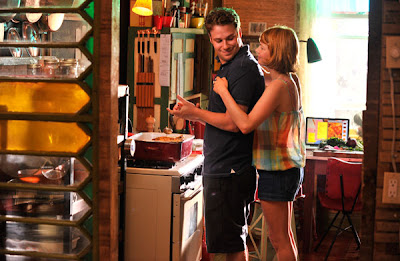Those in attendance at this year's first installment of EFF Portland no doubt heard a lot of conversation about Portland's past as a mecca for experimental film. To a certain extent, the mission statement of the new festival centered around rebooting that legacy. One could easily point out the loose collective of video and film artists known as Peripheral Produce as being one of the touchstones of Portland's experimental past. From the mid-90s through the first decade of the new millennium, the film collective dipped their paws into exhibition, distribution and, perhaps most influentially, began a local festival (PDX Fest) for highlighting experimental fare.
This Saturday night Peripheral Produce rises from the ashes to celebrate the re-release of their 1996 video compilation the Auto-Cinematic Video Mix Tape. Collective organizer Matt McCormick has cobbled together a showcase of new and old experimental work for the evening's entertainment, replicating the feel of the collective's legendary experimental film nights. Audiences can expect to see works by McCormick, Miranda July, Vanessa Renwick, Andy Blubaugh, Ashby Lee Collinson, Orland Nutt, Rob Tyler and many more.
Consider it a forum of sorts between the wizened elder statesmen (okay, statespeople...this is the 21st century, after all) and the new school of underground film kids. By all means, take notes, folks...this is how it's done.
Let's all take a moment to gaze upon an excerpt from the press release:
The August 4th show will feature seminal Portland works along with a selection of new works from Portland’s fast rising “next generation” of experimental filmmakers. The show and DVD features acclaimed artist and filmmaker Miranda July’s 1996 video Atlanta. Atlanta was July’s first significant video piece, and shows the makings of her sharp sense of humor and attention to detail found in her later blockbuster works (Me and You and Everyone We Know, The Future).
The show and DVD also include writer/filmmaker Jon Raymond’s 1997 piece Battles on the Astral Plane, a clever mocking of the popular Mortal Kombat video game that shows Raymond’s crafty, self-effacing wit that can still be found in his books and screenplays (Wendy and Lucy, Meek’s Cutoff, Livability). Vanessa Renwick, Chel White, Rob Tyler and Matt McCormick also offer works from early in their career.
Also included in the program is new works from NW Film Festival winner Orland Nutt and TBA darling Ashley Lee Collinson, as well as work from Stephen Slappe, Andrew Blubaugh, Ben Popp, Jim Blashfield, and many others.
The Peripheral Produce manifesto
the subconscious art of graffiti removal (excerpt) from matt mccormick on Vimeo.
Peripheral Produce's dvd release party for the Auto-Cinematic Video Mix Tape happens at the Hollywood Theatre on Saturday, August 4th at 8pm. More info available here.
Remember to find and "like" us on our Facebook page.
Subscribe to the blog's feed here.

































